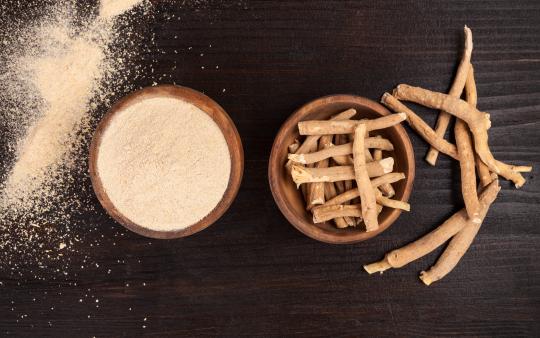Ashwagandha (Withania somnifera), also commonly called Indian ginseng, poison gooseberry, or winter cherry, is a powerful therapeutic perennial herb originally from South Asia. Thanks to the many chemical compounds within the herb, including multiple alkaloids, withanolides, and sitoindosides, ashwagandha promotes healing in different ways: from the topical healing properties found in its berries and leaves, to its role in supporting energy, vitality, and the body’s stress response found in the tubers and roots. While relatively new to us in the West, ashwagandha has been used for centuries and is a staple therapeutic in traditional Ayurvedic medicine.
What are adaptogens?
We love ashwagandha’s versatility and power to positively impact so many different concerns and commonly use it in our practice. Numerous studies have shown that ashwagandha can greatly benefit patients with neurological disorders, including obsessive compulsive and bipolar disorders, and ataxia (inability to coordinate muscle movements), by improving cognitive recognition and function. And when taken at higher therapeutic doses (1–5 g daily) it’s also been shown to regulate blood sugar and blood cholesterol levels, increase muscle strength and mass, decrease pain, and help increase immune function.
There’s also research that supports ashwagandha’s role in improving reproductive health, both for women and for men. Women have reported improvements in female sexual function including sexual interest, arousal, lubrication, and in achieving orgasm. In men, numerous studies support ashwagandha’s ability to increase testosterone production, and improve serum biochemistry levels, sperm count, and motility in those diagnosed with infertility.
One of the most common reasons we turn to ashwagandha is because of its amazing adaptogenic properties! Adaptogens are a group of herbs that support the body’s ability to deal with stressors (whether chemical, emotional, or physical) by enhancing its adaptive response. Our bodies are inundated daily with stressors—fatigue, anxiety, deadlines, social and physical pressures, toxin exposure, and stressful events—and we often need help to support those stress responses that are constantly firing. Ashwagandha has been found to improve energy levels and cognitive function by balancing the hormones secreted by the adrenal glands, and it also helps calm an anxious nervous system, with patients reporting reduced symptoms of stress and improved coping capability. This may mean better sleep and a reduction in glucose levels and sugar and salt cravings.
Fruitful Knowledge
Ashwagandha is part of the Solanaceae, or nightshade, family and is botanically related to tomatoes, potatoes, and peppers!
Caution: Ashwagandha is not suggested for young children and is not considered safe for pregnancy.
Dosing: Commonly prescribed as a tablet, capsule, tea, tincture, or powder, it can also be found as part of a stress formulation. Ashwagandha shines as a single herb and while therapeutic dosing can vary, 500–600 mg, one to two times daily, is a great support in most cases. As with all new supplementation, please speak to your healthcare provider to ensure it’s right for you and your specific needs.
You may also enjoy: Ashwagandha: Essential in Your Parental Toolbox for Managing Stress, Holistic Remedies for Anxiety and Stress Relief, and The Benefits of Ashwagandha for Stress and Anxiety.









